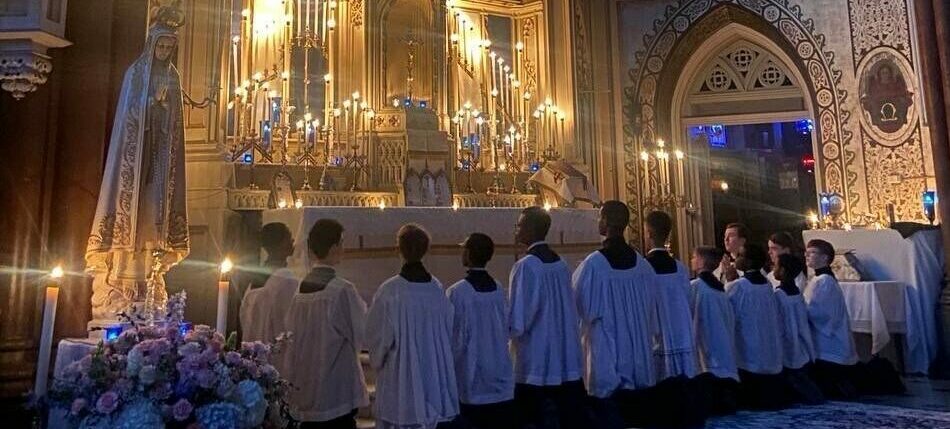p/c St. Alphonsus parish, Baltimore.
In Advent, you already know that we are waiting for the first coming of Jesus as He comes in gentleness and the Second Coming of Jesus in justice. But I want to admit some misunderstandings I had of world history—specifically the state of the world in waiting for the First Coming of Jesus.—that may shed some light in how we look for the Second Coming of Jesus.
For my thanksgiving after Mass, I am now using a 19th century book of Jesuit Meditations from Angelus Press called “Practical Meditations For Every Day of the Year.” It is old-school Jesuit, not new. Every day of the year has an Ignatian meditation that usually pertains to the liturgical season. But like all good Jesuit meditations, you use your imagination to picture Jesus or Mary or a Saint with you in that season, even in that location.
During Advent, the anonymous Jesuit author has us ask why it took so long from Adam’s fall for Jesus to arrive as Our Savior on the scene of world history. He quotes an unnamed Church Father: “If the satisfaction and restoration had closely followed the offence, man would never have learned the full-extent of the moral degradation caused by sin, nor the impossibility of raising himself out of it, and consequently the greatness of the benefit of redemption.” In other words, we made our bed in original sin. Then, we had to lie in it for 4,000 years to understand how offensive it was to God.
At the birth of Jesus Christ, I had thought the world was in worst state of all of history. But that old-school Jesuit book corrected me on that. He writes: “When did the Savior of the world appear on the earth? The fortieth year of the reign of the Emperor Augustus, when nearly all the people of the known-world submitted to the Roman empire and were ruled by the same laws, and the whole world was at peace. This immense extent of the Roman empire, the fourth of the monarchies foretold by Daniel, together with universal peace after seven centuries of war, was visibly arranged by Providence to facilitate the propagation of the Gospel, which was to form out of all nations one family in Jesus Christ.”
Of course there was violence and wars on the earth at that mysterious threshold of BC and AD when Christ was born, but there must have been relative peace in the Mediterranean region, for we hear in both the Midnight Christmas liturgy and the Roman Martyrology the following: “In the sixty-fifth week, according to the prophecy of Daniel; in the one hundred and ninety-fourth Olympiad; in the year seven hundred and fifty-two from the founding of the city of Rome; in the forty-second year of the empire of Octavian Augustus, when the whole earth was at peace, in the sixth age of the world, Jesus Christ, eternal God, and Son of the eternal Father, desirous to sanctify the world by His most merciful coming, having been conceived of the Holy Ghost, and nine months having elapsed since his conception, is born in Bethlehem of Juda, having become man of the Virgin Mary… The Nativity of Our Lord Jesus Christ, according to the Flesh.”
We can all agree that the Greek language and the Roman roads had united millions of people before Christ was born. This had to be Divine Providence, even working through the violence of numerous stages of world history history up to that point. The Jesuit Meditation book then asks us to look past the veneer of our current issues in Church and State and see what God is doing behind the scenes for both His First Coming in Gentleness (tomorrow) and His Second Coming in Justice (at an unknown date.) The 19th-century Jesuit author continues this encouragement by writing words that seem to pertain to us today in 2023 in a specific way:
“If we follow with the eyes of faith the events which the course of the ages displays on the world’s stage, we shall see in our own days the working of Divine Providence, which so wonderfully causes everything to carry out His eternal designs and the salvation of His elect. Let us take care not to reason about public events as the men of this world generally do; they look on them as a game or the result of chance, of prudence or imprudence on the part of statesmen. But we, better enlightened, should reason as men of faith; let us see and bless the hand of God in everything which happens, and behold Him directing the course of events towards ends often far from our thoughts. In this way we shall please God, edify others, and do good to ourselves. We shall grow in faith, hope and love of God.”—Practical Meditations, p 805.
